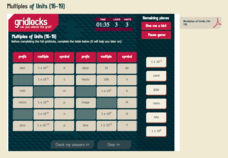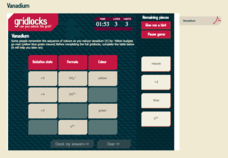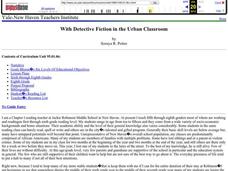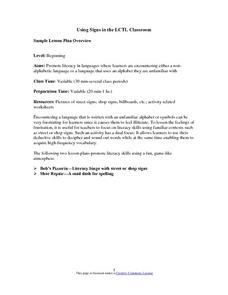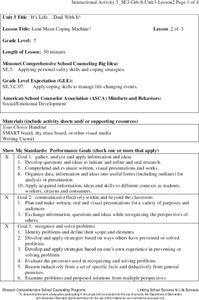Royal Society of Chemistry
Organic Formulae 2
Is your chemistry class frustrated by the multitude of representations of organic molecules? Add some challenging puzzles to an otherwise ho-hum organic lesson and let the fun begin! The second of a two-part activity focused on basic...
Royal Society of Chemistry
pH and pOH
Feeling a little neutral about your pH and pOH teaching strategy? Perk it up with engaging puzzles! Young scientists relate ion concentration to pH and pOH, as well as the dissociation constant for water. The resource is available as an...
Royal Society of Chemistry
pH 4: Activity
Sometimes playing games in class isn't a bad thing. Science sleuths evaluate and calculate pH and pOH with an online resource. They then manipulate concentration information and relate it during a series of puzzles.
Royal Society of Chemistry
Shapes of Molecules—Distortion from the Pure Geometry
Ready to introduce the realities of molecular geometry to chemistry pupils? Use a logic-based interactive! Perfect as individual practice, the puzzles explore the bond angles and repulsions present in three common molecular shapes.
Royal Society of Chemistry
Shapes of Molecules—Hybrid Orbitals
Take your chemistry class' knowledge of molecular geometry to the next level! Introduce orbital hybridization with a series of related games. Individuals complete a data table in the first activity, then solve Sudoku-like puzzles using...
Royal Society of Chemistry
Significant Figures
Ready to add some innovation to your significant figures lesson? Pupils practice sig fig rules using a puzzle approach. Check out the Teacher's Area for printable materials, an answer key, and strategies for implementing the resource.
Royal Society of Chemistry
Some A-level Reagents
Learning names and formulas can be a daunting task for young chemists, so support their study with interactive puzzles! First, users match each formula with its correct name. Then, individuals use them to complete three logic games.
Royal Society of Chemistry
Sub-shells
Is your class in a quandary over quantum numbers? Change things up by adding games to the mix! Science scholars discover the shape, number of electrons, and number of orbitals in the s, p, and d sub-shells using an interactive.
Royal Society of Chemistry
Multiples of Units (16-19)
It's a parade of prefixes! Chemistry scholars identify common prefixes used throughout the sciences using an interactive puzzle series. Learners solve puzzles by pairing the prefixes with the power of ten they represent.
Royal Society of Chemistry
Symbols
Chemistry calculations can look a bit like alphabet soup at times. How do you help pupils make sense of it all? An interactive resource helps scholars sort through the symbols for common quantities such as moles, boiling point, and...
Royal Society of Chemistry
Vanadium
Introduce your chemistry scholars to the periodic table's Goddess of Beauty! Through an interactive that highlights the transition metal vanadium, learners discover the colors produced in solution as vanadium changes oxidation state....
Curated OER
With Detective Fiction in the Urban Classroom
This abstract for an instructional unit using three-minute mysteries, stories by Sir Arthur Canon Doyle, and Edgar Allan Poe includes a short history of detective fiction, sample plans, and suggestions for exercises and activities...
Benjamin Franklin Tercentenary
Let’s Throw an Electric Science Party!
Are you looking for a shockingly good lesson? Check out one that has middle schoolers recreate four of Benjamin Franklin's experiments. Groups investigate, observe, and draw conclusions about static electricity and electrical current....
Radford University
The Pythagorean Theorem in Crime Scene Investigation
It's a Pythagorean who-dun-it. Pupils apply the Pythagorean Theorem in several different real-world scenarios involving right triangles. By solving each task, they find the thief who was responsible for a museum heist.
Curated OER
Medicare Reform
High schoolers calculate how much of each paycheck is deducted into the Medicare system, explain the need for health insurance and Medicare, and work in small groups to develop their own plan to reform Medicare.
ConnectED
Crime Scene Investigation
How exactly does a crime scene investigation work? The resource, a unit on criminology, covers everything from the deductive reasoning skills needed for detectives to DNA fingerprinting, all the way to how to gather evidence and bring...
Curated OER
Why can't We Use SSA to Prove Triangles Congruent?
Students investigate triangles and congruences. In this geometry lesson plan, students differentiate between inductive and deductive reasoning. They differentiate between similar and congruent triangles.
Curated OER
Signs and Symbols to Acquire Language
Students utilize deductive reasoning to decipher unfamiliar words and sounds. They acquire high-frequency words by viewing street signs and playing phonics games. Students This lesson is intended for students acquiring a foreign language.
Stanford University
Chronology: Civil Rights in the 20th Century
Test pupils' knowlege of history and the way civil rights movements unfolded using a series of images. With a primary source analysis activity, scholars practice their chronology and deductive reasoning skills. They use their knowledge...
Curated OER
Antonyms 3
The value in this antonyms worksheet is in the richly detailed explanations that follow the exercise. Not only is the correct antonym identified, but the reasons why the other foils are incorrect are also explained.
Missouri Department of Elementary
Lean Mean Coping Machine!
Seventh graders are asked to choose and rank five scenarios from a list of ten that are most important to them. After explaining the reasons for the choices, they then identify the coping skills they used to make their decisions.
Curated OER
Where are Grandma's Teeth?
Young scholars practice using prepositions and deductive reasoning. In this preposition game, students work in groups to determine where Grandma has lost her dentures. Young scholars eliminate places as clues are revealed.
Curated OER
Everyone has Interesting Stuff
Students examine a random collection of artifacts. In this deductive reasoning and cultural awareness lesson, students will pair up and examine a given artifact. Each student will attempt to use the artifact's attributes and apparent...
Virginia Department of Education
Logic and Conditional Statements
If there is a conditional statement, then there is a hypothesis and conclusion. Pupils learn how to identify the parts of conditional statements. Class members continue to work with conditional statements and rewrite them in their many...
Other popular searches
- Deductive Reasoning Puzzles
- Deductive Reasoning Math
- Deductive Reasoning Problems
- Geometry Deductive Reasoning
- Deductive Reasoning Essay
- Deductive Reasoning Pictures
- Health Deductive Reasoning
- Inductive Deductive Reasoning
- Decimals Deductive Reasoning










